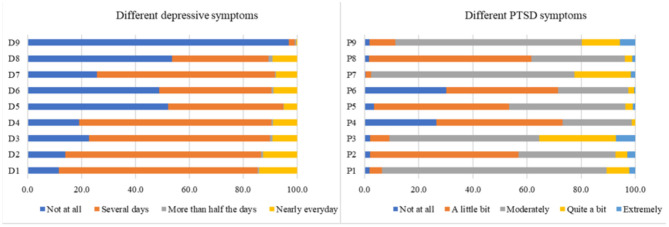Figure 2.
Symptoms of depression and PTSD. D1, Little interest or pleasure in doing things; D2, Feeling down, depressed, or hopeless; D3, Trouble falling or staying asleep, or sleeping too much; D4, Feeling tired or having little energy; D5, Poor appetite or overeating; D6, Feeling bad about yourself or that you are a failure or have let yourself or your family down; D7, Trouble concentrating on things, such as reading the newspaper or watching television; D8, Moving or speaking so slowly that other people could have noticed. Or the opposite being so fidgety or restless that you have been moving around a lot more than usual; D9, Thoughts that you would be better off dead, or of hurting yourself; P1, Having “flashbacks”, that is, you suddenly acted or felt as if a stressful experience from the past was happening all over again (for example, you re-experienced parts of a stressful experience by seeing, hearing, smelling, or physically feeling parts of the experience); P2, Feeling very emotionally upset when something reminded you of a stressful experience; P3, Trying to avoid thoughts, feelings, or physical sensations that reminded you of a stressful experience; P4, Thinking that a stressful event happened because you or someone else (who didn't directly harm you) did something wrong or didn't do everything possible to prevent it, or because of something about you; P5, Having a very negative emotional state (for example, you were experiencing lots of fear, anger, guilt, shame, or horror) after a stressful experience; P6, Losing interest in activities you used to enjoy before having a stressful experience; P7, Being “super alert”, on guard, or constantly on the lookout for danger; P8, Feeling jumpy or easily startled when you hear an unexpected noise; and P9, Being extremely irritable or angry to the point where you yelled at other people, got into fights, or destroyed things.

